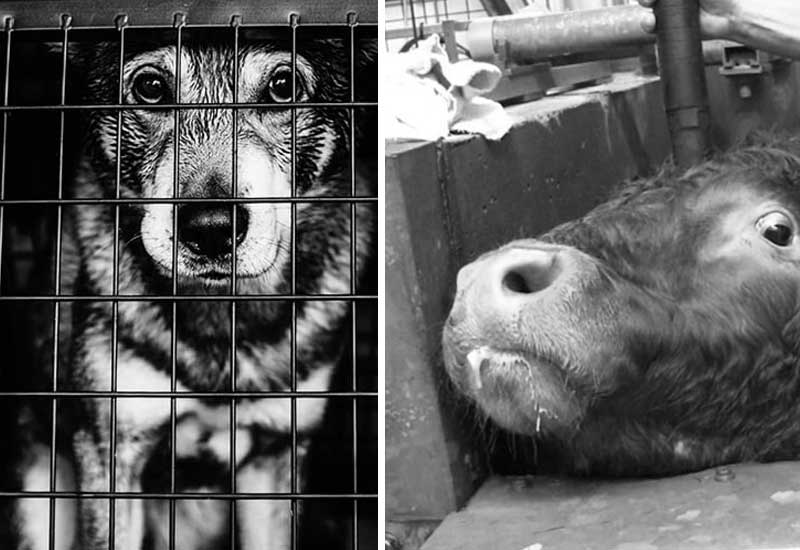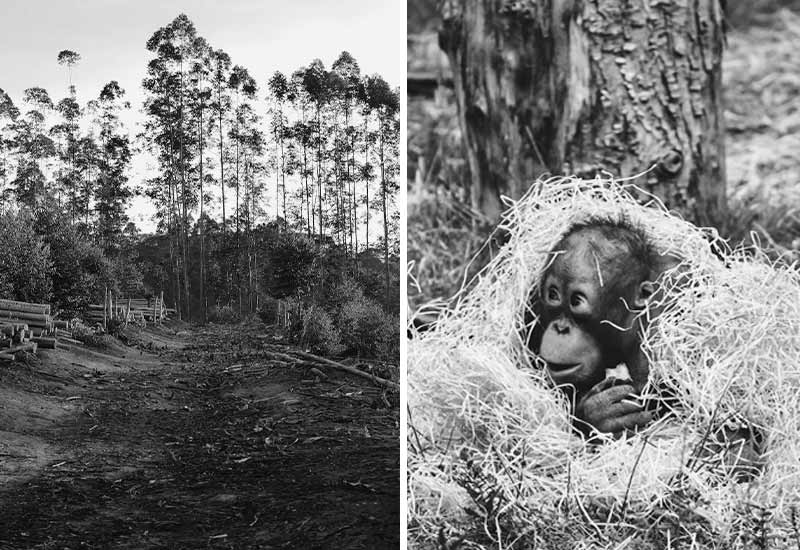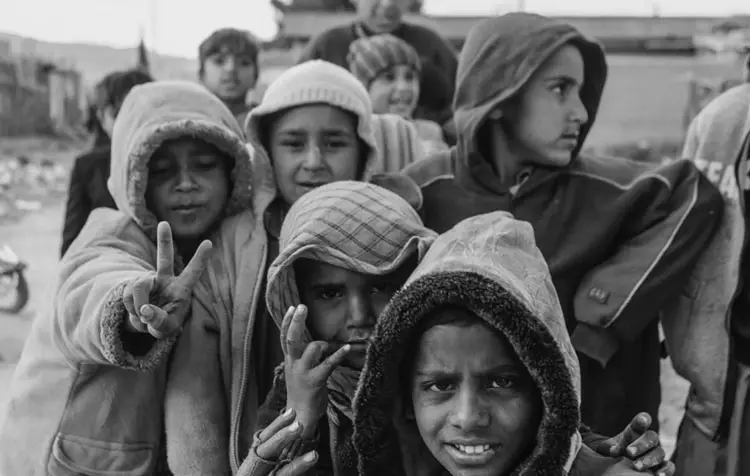What is meant by inconsistent behavior? And do you also know things that nobody actually wants, but that are nevertheless supported or encouraged by most people? Our actions have consequences. Mercy, compassion, charity, kindness, tolerance, helpfulness - with these positive character traits we describe human action. But if we deviate from these values for a variety of reasons, inconsistent and ultimately inconsistent action can also have serious consequences - both for ourselves, but above all for third parties.
In this, admittedly somewhat unusual article, I would now like to present you with examples of inconsistent and contradictory behaviors that most people in our society consciously or unconsciously display. You'll learn both why this is so and how you can bring your thoughts and actions back into harmony. Let's go!
Here you can find a short overview in advance:
- cruelty to animals
- Child labor
- World Hunger
- Rainforest destruction
- Racism
- Bee Die-Off
- Inner city death
- Escape
- Diseases
- Uncertain future of children & grandchildren
What exactly is inconsistent behavior?
Before we move on to the examples, I would like to briefly explain the term inconsistency. It stands for inconsistency and contradictoriness. Inconsistent behavior is understood to mean the Inconsistency between a person's (inner or expressed) attitude and actual actions..
On the basis of the following examples, you will quickly recognize that thinking and acting often simply do not harmonize logically with each other. The logical consistency is missing. The uneasy feeling that this often triggers inner conflict is, by the way, referred to as cognitive dissonance designated.
What is the difference between inconsistency and inconsistency? Inconsistency is the state of contradiction between two things, inconsistency the defective, illogical reaction to it.
10 examples: Things that no one actually wants, but (almost) everyone supports
Possibly you think that you are always behave in a reasonable, rational and consistent manner - and that your personal values are exactly in line with your everyday behavior. But you are guaranteed to have one or two habits in your life that have consequences that you actually oppose with every fiber of your being. Maybe even things you really detest.
Here are the promised examples of contradictory behaviors that most people engage in - whether they themselves want to and know it, or not.
1. "I am against animal cruelty and suffering."

Most of us would probably say of ourselves that we put our heart and soul into fighting against cruelty to animals are. We would help injured, abused animals (whether dog, cat, chicken or cow) immediately when we notice it - and report the people who use violence, torture and kill them.
But for some reason, we put on the blinders when it comes to our own food. Pigs, for example, are herded alive into the slaughterhouse and then come out as packaged cubes of bacon - and we believe that something "humane" has happened inside the walls. But humane slaughter is an illusion - the "most animal-friendly" Killing method is CO2 gasification, in which the animals die in stabbing pain or are anesthetized. Whether pig, chick, calf or little lamb -. there is simply no human way to take the life of a living being.
Therefore, it is inconsistent behavior to be against animal cruelty but at the same time pay money for someone to torture animals behind closed doors in order to produce animal food. Even "organic meat" and "pasture-raised milk" do not change this. The only logical consequenceThe best way to bring one's own thoughts and actions in line in this respect is to stop consuming animal products and to live vegan.
2. "I am against child labor."
Whether Coffee, cocoa, palm oil, clothing, electronics, tobacco, leather or gold - Child labor is unfortunately a common component of many industries. UNICEF, the United Nations Children's Fund, defines child labor on its own website as follows:
"Work for which children are too young or that is hazardous or exploitative, harms physical or mental development, or prevents children from attending school. Child labor deprives children of their childhood and violates children's rights worldwide."
Each of us would probably claim to be against the exploitation of children and vehemently reject any accusation that suggests otherwise.
But even though child labor is both a cause and a consequence of poverty, and armed conflict, the Climate Changeand urbanization promotes it: we consumers are partly to blame! On the one hand, because we people in the western industrialized nations are the excessive consumption of cheap goods that are outsourced to low-wage countries without labor protection standards. But on the other hand also because we are more Drivers of global warming are.
How Stop and prevent child labor lets? When making your purchases, be sure to look for the Fairtrade seal - it stands for fairly grown and traded products, with transparent supply chains. The GOTS and IVN textile labels are important references when buying clothes. Give preference to Fairtrade chocolate, use technical devices as long as possible and do not follow every new trend! Make your life more climate friendly. And if possible, also support organizations such as UNICEF, which are actively working against child labor every day.
3. "I don't want people to go hungry."
As a child, you learn early on that you should value your meals because there are people in the world who have to fight for every bite. According to Welthungerhilfe 828 million people go hungry worldwide - and every thirteen seconds, a child under the age of five dies because they don't have enough food on their plate.₁
No one wants that - but no one should be surprised that it can still happen at all in our times! After all, it speaks for inconsistent behavior that around 931 million tons of edible food are thrown away worldwide₂ and that we feed 56 billion farm animals₃ every year, but not 8 billion people.
The main contributor to this distribution problem is our Western, wasteful lifestyle with preference for animal foodssuch as meat, milk, cheese and eggs. Climate change also ensures that the harvests and livelihoods of the people who contribute the least are destroyed.
If we use the Stop world hunger we as consumers need to rethink the way we eat. For example, by planning our meals ahead, sticking to the grocery list, turning leftovers into smoothies, and freezing surplus meals, we can reduce our own Reduce food waste. And a conscious, vegan diet contributes to the fact that the plants are directly consumed by us instead of being used as animal feed for the Factory Farming to grow and then eat the animals and their excreta (eggs, dairy products & Co).
4. "I don't want the rainforest to disappear."

We all love tropical rainforests, don't we? The unique evergreen lungs of the earth are the Home to over 2 million species of animals and plants. Nevertheless, since 1990, for example, over 400,000 square kilometers have been cleared in the Amazon - an area as large as Denmark and Germany combined.₄ The animals are losing their habitat - the Species Extinction is progressing with great strides.
The cause of the Deforestation is primarily due to economic interests. For at least 70 percent of the cleared areas, the Creation of pasture land and the cultivation of animal feed for factory farming responsible.₅ Palm oil cultivation for food and cosmetics also plays a role.
What you can do to Save rainforests and to stop the inconsistency in one's own actions? A pure vegetarian diet is the step that can make an extremely big difference from one day to the next. In addition, I advise you to avoid palm oil products. With the App Codecheck you can quickly identify them with a barcode scan.
5. "I am not racist."
Racism is a way of thinking and acting that assumes that there are different races of people and that People with certain, biological characteristics less value are. For example, they are discriminated against, devalued and marginalized on the basis of their origin, hair, name, language or skin color.₆
Hardly anyone would claim to be a racist or right-wing extremist. But besides open, hateful, racist insults, there are also more subtle forms of racism that lead many of us to make a racist statement from time to time - usually only at second glance. The so-called Everyday Racism appears rather inconspicuous - for those affected, however, the following casual remarks, for example, are anything but quickly forgotten:
- "Where are you (really) from?"
- "But you speak good German!"
- "This isn't the Hottentots, is it?"
- "Can I touch your hair?"
- "You're exotic!"
- …
Such questions and phrases suggest that someone is unusual, different, perhaps even peculiar. To Fight racismwe must learn to adapt our choice of words. This may probably not change any social framework conditions, however it prevents existing racism from constantly reproducing itself.
6. "I don't want the bee to disappear."
The bee is the Ambassador of biodiversity and on the popularity scale in the animal world on a real high. Also because they are known as Plant pollinator plays a crucial role in global food security. In Germany alone, around 80 percent of crops have to be stunned by bees.₇ What does this have to do with inconsistent behavior? Most people would probably claim to be bee lovers and protect the insects.
But the Bee Die-Off is progressing - and the biggest driver is once again man. Dense building development in cities, monocultural agriculture or the use of pesticides are causing it trouble.₈ Breeding the susceptible honey bee for honey also poses the risk of transmitting diseases to wild bees.
If you want to protect the bee, you should use your Garden bee friendly. Set for example flowering plants, such as thyme and lavender. Build a Bee hotel and put the insects Nesting aids available. Refrain from the use of pesticides and prefer in your purchases Organic food, which is made from organic farming without the use of pesticides.
Tip: The bee is not the only animal at risk. As each of us knows the Stop insect mortality you can read in the linked article.
7. "I don't want the small stores to disappear from downtowns."

Under the terms "inner city death" or "store death" we are all familiar by now with the Structural business closures in the stationary retail sector. The empty rooms and bare windows of former stores, adorned only by a few old brand stickers, are hard to bear. There is hardly anyone who welcomes this image - except perhaps some e-commerce companies and a few online retailers. After all, the ever-growing online trade is considered to be the main cause of the death of stores in the city centers.
Where is the inconsistency? Although consumers now see themselves as responsible₉, most people continue to prefer the convenience of online shopping - especially with Amazon. Incidentally, the company's share of online retail sales in Germany was already 53 percent in 2020.₁₀
So anyone who is really interested in ensuring that the inner cities remain as vibrant as possible or become so again as quickly as possible should again prefer to buy locally and support the regional businesses instead of the big players. A step out of the grown habits is necessary for this.
8. "I don't want people to have to leave their homes."
How rotten it would feel to be responsible for other people having to flee their homeland because of your own behavior. War and violence, human rights violations, hunger, environmental disasters, climate change... the list of causes of flight is endless. No one welcomes the fact that people have to leave their belongings behind to flee for all kinds of reasons. Some people in Germany even take to the streets for demonstrations because they don't want any refugees in Germany.
As a rule, they themselves are to blame for the global social problem that they do not want to have. Environmental Refugees leave their country, for example, due to floods, droughts, crop failures or major fires. Scenarios that occur due to the climate-damaging behavior in our society, are increasingly likely to occur in the future.
Not every cause of flight can be prevented - but at least environmental causes we can all prevent by a lifestyle as sustainable as possible counteract in a targeted manner.
9. "I don't want to get sick."
Health is the most important thing in life, don't you think? This can be confirmed above all by people who have had a serious illness themselves or who have lost a loved one due to an illness. But basically, of course, everyone strives to stay healthy. However, this aspiration is not always reflected in one's own behavior.
"Health is not everything, but without health, everything is nothing."
(Arthur Schopenhauer (more under Health Quotes)
Quit smoking? Impossible! From meat eater to vegan? No chance! More movement in everyday life? No time! It is hard to imagine that being healthy and staying that way for a long time is the top priority for most people. But above all nutritional diseasessuch as obesity, type 2 diabetes mellitus or high blood pressure, for example, can already be caused by a vegetarian diet prevent.
If you really grow old and live as long as possible you should stop smoking, drink plenty of water, go to preventive care, spend a lot of time in nature, make sure you get plenty of exercise and sleep - and last but not least, find tasks that fulfill and excite you. Discard your inconsistent behavior and enjoy a calming clarity in your life.
10. "I don't want my children and grandchildren to grow up on an uninhabitable planet."

Climate change, increasing natural disasters, wars over resources, water scarcity, beaches full of plastic waste, poisoned rivers, polluted air... the Environmental problems of our time are man-made - and therefore, at least in theory - solvable.
Now, one might expect that a jolt will go through our society and we will change our behavior to conserve natural resources and to preserve the planet for future generations as well. After all, who wants their own children and grandchildren to face an uncertain future? Everyone would probably do everything imaginable for their offspring. But changing one's own habits doesn't necessarily seem to be one of them.
Those who do not want to continue to live at the expense of future generations or other people should therefore follow the Put an end to the exploitation of nature for one's own way of life and learn to live more sustainably. Switching to a green power provider, Eat less meatReducing your own plastic waste, traveling in a more environmentally conscious way and using public transport more often instead of airplanes and cars would definitely be a good start.
Ending inconsistent behavior means reconciling talk and action
I can imagine that you would support most of the things from this post - but also that you are still acting contrary so far. Sometimes without knowing it, but maybe even though you know it. Inconsistency is mostly a result of our ingrained habitsthat first want to be put down. But not paying more for things you don't want anyway should be a good motivation.
Fortunately, demand determines supply. We are able to adapt and make rational decisions, even if drastic Changes are often difficult.
I really hope that this little reality check has helped you. Could you discover inner conflicts or contradictions between your attitude and your actions? If so, this is your chance to stop your possibly inconsistent behavior.
Do you have any questions, tips or suggestions? Are there perhaps things that you have unintentionally supported? Then I look forward to your comment.
Stay consistent,

PS.: Do you already know the Ostrich tactics? You can learn more about how we humans deceive ourselves and avoid problems in the linked article now.
References:
₁ Deutsche Welthungerhilfe e.V.: Hunger: Spread, Causes & Consequences, available at https://t1p.de/ijuj [04.10.2022].
₂ Deutsche Welthungerhilfe e.V.: End food waste, available at https://www.welthungerhilfe.de/aktuelles/blog/lebensmittelverschwendung. [04.10.2022].
₃ M. P. Rowland: 11 Facts About Your Food That Will Shock You (as of Jan. 03, 2017), available at https://t1p.de/2sr1. [14.07.2020].
₄ INPE: Amount of deforested area in the Amazon from 1990 to 2021, available at https://de.statista.com/statistik/daten/studie/478063/umfrage/menge-der-abgeholzten-waldflaeche-im-amazonasgebiet. [04.10.2022].
₅ Pro REGENWALD e. V.: Fleisch ist ein Stück Lebenskraft, available at https://www.pro-regenwald.de/hg_fleisch. [04.10.2022].
₆ Federal Agency for Civic Education/bpb: Racism, available at https://www.bpb.de/kurz-knapp/lexika/lexikon-in-einfacher-sprache/322448/rassismus. [04.10.2022].
₇ Press and Information Office of the Federal Government: Bees Need Our Protection (May 19, 2018), available at https://www.bundesregierung.de/breg-de/aktuelles/bienen-brauchen-unseren-schutz-1008800 [Oct. 04, 2022].
₈ youknow: bee death explained in 3 minutes, YouTube, 10.11.2016, web, 04.10.2022 at 15:50, in: https://www.youtube.com/watch?v=R1PAb2My-Qs.
₉ S. Greifsmühlen: Current Study - The Great Store Death (Apr. 24, 2019), available at https://www.presseportal.de/pm/52458/4253637 [04 Oct. 2022].
₁₀ Handelsverband Deutschland: Amazon expands power in retail, available at https://de.statista.com/infografik/22272/anteil-von-amazon-an-den-einzelhandelsumsaetzen-in-deutschland. [04.10.2022].






